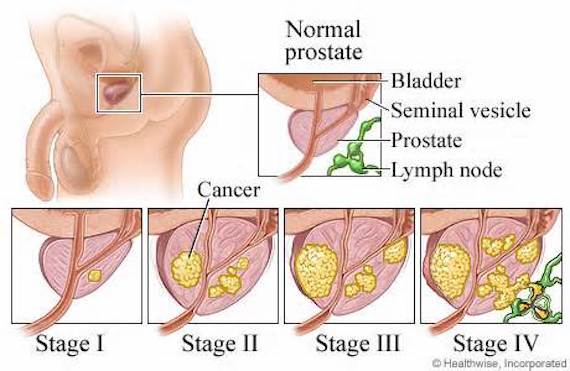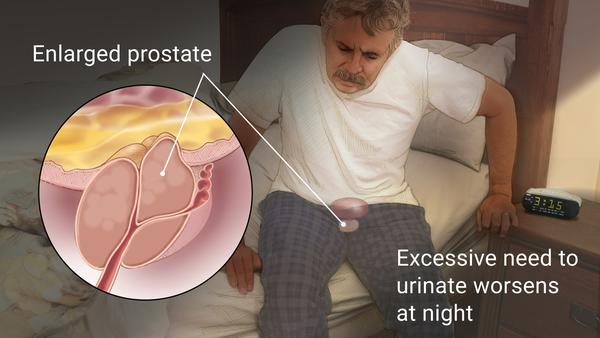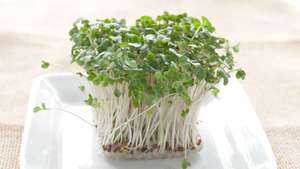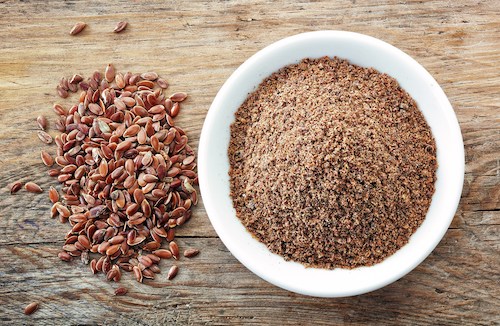Prevent Prostate Cancer with Diet (and BPH too)
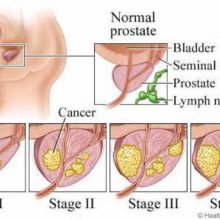
Prevent prostate cancer with diet by eating plant food, especially cruciferous vegetables, and flax seeds. If your prostate is enlarged, a plant-dominate diet can help as well.
In the United States, prostate cancer is the second most common cancer among men [1a]. In 2019, 224,733 new cases of prostate cancer were reported and 31,636 men died of this cancer [1b]. According to the NIH Cancer, an estimated 268,490 new cases will be identified in 2022 and 34,500 deaths will occur [2].
Globally, a total of 1,414,259 new cases of prostate cancer and 375,304 related deaths were reported in 2020 [3].
The prostate is a walnut-sized gland located in front of the rectum, between the bladder and base of the penis. Glandular tissue in the prostate can become cancerous, just as it can in the breast. And that happens a lot.
Autopsy studies show that about half of men over the age of eighty have prostate cancer [4]. Typically, most men die with prostate cancer without ever knowing they had it. But as mentioned, more than 375,000 weren’t so lucky in 2020.
The good news is that you can largely prevent prostate cancer with diet by eating plant food, especially cruciferous vegetables, and flax seeds. The same goes for benign prostatic hyperplasia (BPH), which more than half the men over 50 struggle with as they dash off to the bathroom every hour.
Here's what I cover in this post:
Prostate Cancer Symptoms and Tests
The Mayo Clinic lists these symptoms of prostate cancer [5]
- Trouble urinating
- Decreased force in the stream of urine
- Blood in the urine
- Blood in the semen
- Bone pain
- Losing weight without trying
- Erectile dysfunction
But that list is not definitive. According to the World Cancer Research Fund International [6]:
There is strong evidence that:
- Being overweight or obese increases the risk of advanced prostate cancer
- Being tall increases the risk of prostate cancer
- Consuming beta-carotene (in the diet or as supplements) is unlikely to have a substantial effect on the risk of prostate cancer
There is some evidence that:
- Higher consumption of dairy products might increase the risk of prostate cancer
- Diets high in calcium might increase the risk of prostate cancer
- Low plasma alpha-tocopherol concentration (vitamin E) might increase the risk of prostate cancer
- Low plasma (blood) selenium concentrations might increase risk of prostate cancer
A little later, I’m going to dive into the impact dairy consumption has on the prostate (as well as poultry), because studies show it’s significant. But first, let’s check out two tests that can evaluate the health of your prostate.
The digital rectal exam and PSA Test
If you’re a man over 40 years old and you haven’t gotten a prostate exam, ask your doctor to examine you and do a PSA test.
The first step in screening for prostate cancer is a conversation with your doctor. He or she might elect to perform a screening test, like a digital rectal exam, or refer you to a urologist who specializes in prostate health.
Next, your doctor might recommend a blood test, called the prostate-specific antigen (PSA) test. This test measures the amount of PSA in the blood, which helps to indicate the health of the prostate.
PSA Levels:
- If your PSA levels are within a normal range (1.0 to 3.0 ng/mL), make sure you get a PSA screening about every one to two years.
- If your PSA levels are in a higher range (3.1 ng/mL or above), further testing and monitoring is required.
If you want to get a PSA test on your own, check out the Prostate-specific Antigen (PSA) Ultrasensitive Blood Test offered by Life Extension Foundation.
Now that you have an idea about the prevalence of prostate cancer, the symptoms and how to test for it, let’s dig into how to prevent prostate cancer with diet, which as you’ll soon see also applies to ameliorating the deleterious affects of prostate cancer, as well as enlarged prostate (BPH).
Prevent Prostate Cancer with Diet
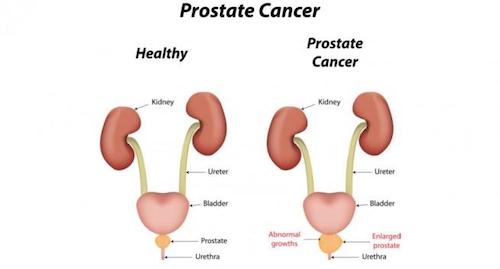
Prostate cancer rates vary tremendously around the world, and the difference seems to be centered on what people eat. For example, African Americans may have an incidence of clinically apparent prostate cancer that is about 30 times greater than that of Japanese men and 120 times greater than that of Chinese men. This discrepancy has been attributed in part to the higher amounts of animal protein and fat in Western diets [7], and the soy common in many Asian diets, which contains protective phytoestrogens called isoflavones [8].
Put men on a plant-based diet for a year and the blood circulating within their bodies can suppress cancer cell growth by 70%, nearly eight times better than a meat-centered menu [9].
If a healthy diet can make your bloodstream a cancer-fighting elixir, why not use it to treat cancer, not just prevent it? Other leading killers, including heart disease, type 2 diabetes, and hypertension, can be prevented, arrested, and even reversed by diet, so why not cancer?
These questions have been answered.
To test this question, a study called Changes in prostate gene expression in men undergoing an intensive nutrition and lifestyle intervention recruited ninety-three men with prostate cancer who had chosen not to undergo any conventional treatment [10].
Prostate cancer patients can be an ideal cohort to study the results of interventions that might take some time to be effective. The reason for this is that prostate cancer usually grows slowly, and the side effects of treatments like chemotherapy and radiation can be onerous, and so men with prostate cancer often choose to be placed in a medical holding pattern called “watchful waiting” or “expectant management.”
The hope in this case is that the cancer will grow so slowly (and not spread) that a person will be able to avoid chemotherapy, radiation, and/or radical surgery that may leave him incontinent and impotent.
And so, back to the prostate gene expression study, the prostate cancer patients were randomized into two groups:
- A control group that wasn’t given any diet or lifestyle advice beyond whatever their personal doctors told them to do; and
- A healthy-living group prescribed a strict plant-based diet centered around fruits, vegetables, whole grains, and beans, along with other healthy lifestyle changes, such as walking for thirty minutes, six days a week.
Cancer progression was tracked using PSA levels, a marker of prostate cancer growth inside the body that you can be tested for, as described earlier. After a year, the control group’s PSA levels increased by 6%; the cancer in that group was expected to grow. It was a different story among the healthy-living group — the prostate cancer in that group decreased by 4%.
Biopsies taken before and after the diet and lifestyle intervention showed that the expression of more than five hundred genes was affected. This was one of the first demonstrations that changing what you eat and how you live can affect you at a genetic level, in terms of which genes are switched on and off [11]. (This is the study of epigenetics.)
A year later, cancers in the control group grew sufficiently that 10% of them were forced to undergo a radical prostatectomy [12], a surgery that involves the removal of the entire prostate gland and surrounding tissues. This treatment can lead not only to urinary incontinence (urine leakage) and impotence but to alterations in orgasmic function in approximately 80% percent of men undergoing the procedure [13]. In contrast, none in the plant-based diet and lifestyle group ended up on the operating table.
So, what were these “healthy-living” factors that proved so effective?
- Low-fat, whole-foods, plant-based nutrition
- Stress management techniques
- Moderate exercise
- Participation in a psychosocial group support
These lifestyle factors are not only useful for improving prostate cancer outcomes, but to shrink an enlarged prostate as well.
Diet and Enlarged Prostate
In the United States, benign prostatic hyperplasia (BPH) affects millions of men [14] — as many as half of men by their fifties and 80% of men by their eighties [15]. It appears that if you’re a man and you live long enough, you’re very likely to experience BPH, and that pretty much sucks.
It sucks because, while an enlarged prostate isn’t necessarily cancerous, BPH can obstruct the normal flow of urine if it grows too large. This obstruction can cause a weak or hesitant stream and incomplete emptying of the bladder, requiring frequent trips to the bathroom. The stagnant urine retained in the bladder can also become a breeding ground for infection.
As mentioned, BPH is very common, so much so that most doctors may assume that it’s just an inevitable consequence of aging. But once upon a time it wasn’t. For instance, in China in the 1920s and 1930s a medical college in Beijing reported that BPH affected just 80 cases over 15 years — not 80% of male patients.
The historic rarity of BPH is similarly true in Japan. The reason is that both Japan and China traditionally have plant-based diets [16]. This was proven by researchers who compared the blood of individuals before and after a plant-based diet against the type of normal prostate cells that grow to obstruct urine flow; in other words, a condition that results in BPH. Within just two weeks, those eating plant-based diets saw their blood acquire the ability to suppress the abnormal growth of noncancerous prostate cells, an ability that persisted as long as the diet was adhered to [17]. It appears, then, that as long as we continue to eat healthfully, prostate cell-growth rates will continue to go down and stay down.
At this point you know that what you eat makes a big difference to your prostate health. You know that a plant-dominant diet needs to take preference over a meat-dominant diet. But now let’s get more specific.
How Dairy Consumption Impacts the Prostate

A compilation of case-control studies conclude that cow’s milk consumption is a risk factor for prostate cancer [18], and the same outcome was found for cohort studies [19].
Calcium is associated with milk, and is often cited as the reason for its consumption, but a 2015 meta-analysis found that high intakes of dairy products (milk, low-fat milk, and cheese) appear to increase total prostate cancer risk. This was not true for non-dairy sources of calcium [20].
Click here for more about milk, calcium and osteoporosis.
As people age, they often worry about osteoporosis, and want to do something to prevent it. The Mayo Clinic says that osteoporosis is more likely to occur in people who have low calcium intake, because it contributes to diminished bone density, early bone loss, and an increased risk of fractures [source].
OK, then, is milk the answer? No, cow’s milk is not the answer — a meta-analysis of cow’s milk intake and hip fracture studies shows no significant protection [source].
Researchers investigated the connection between milk intake and mortality, as well as fracture risk in large populations of milk drinkers [source]. In addition to significantly more bone and hip fractures, they found higher rates of premature death, more heart disease, and significantly more cancer for each daily glass of milk women drank. Three glasses a day was associated with nearly twice the risk of dying early [source].
Men with higher milk consumption also had a higher rate of death, although they didn’t have higher fracture rates [source]. Overall, the study showed a dose-dependent higher rate of mortality (in both men and women) and fracture (in women), but the opposite was found for other dairy products, such as soured milk and yogurt, because the bacteria in these foods can ferment away some of the lactose [source].
How Poultry and Egg Consumption Impacts the Prostate
About one man in eight will be diagnosed with prostate cancer during his lifetime, and more than 3.1 million men in the United States who have been diagnosed with prostate cancer at some point are still alive today [21].
If the cancer is caught while still localized within the prostate, your chances of dying from it within the next five years are very small; however, if the cancer spreads far enough throughout your body, your chances of surviving five years may be as low as one in three [22]. No one wants to face those odds, and so scientists have been working hard to identify factors involved in the spread of prostate cancer once it has emerged.
For instance, Harvard University researchers recruited more than one thousand men with early-stage prostate cancer and tracked them for several years. They found that compared with men who rarely ate eggs, men who ate even less than a single egg a day appeared to have twice the risk of prostate cancer progression, such as metastasizing into the bones. The only thing potentially worse for prostate cancer than eggs was poultry: Men with more aggressive cancer who regularly ate chicken and turkey had up to four times the risk of prostate cancer progression [23].
The researchers suggest that the link between poultry and cancer may be due to cooked-meat carcinogens. For reasons yet to be determined, these carcinogens build up more in the muscles of chickens and turkeys than in those of other animals [24].
How about eggs — why do they seem to be cancer-promoting? How could eating less than an egg a day double the risk of cancer invasion?
The answer may be choline, a compound found concentrated in eggs [25].35 Higher levels of choline in the blood have been associated with increased risk of developing prostate cancer [26].36 This may explain the link between eggs and cancer progression [27].
In a paper entitled Choline Intake and Risk of Lethal Prostate Cancer, the same Harvard researchers found that men who consumed the most choline from food also had an increased risk of cancer death [28].38 Men who consume two and a half or more eggs per week may have an 81% increased risk of dying from prostate cancer [29].
This is thought to happen because the choline in eggs, like the carnitine in red meat, is converted into a toxin called trimethylamine [30] by bacteria that exist in the guts of meat eaters [31]. Once oxidized in the liver, trimethylamine seems to increase the risk of heart attack, stroke, and premature death [32].
Eat Cruciferous Vegetables and Flax Seeds
Beyond eating more plant food generally, I encourage you to add two things to your diet:
- Cruciferous vegetables and
- Flax seeds.
Let’s wade into the details.
Cruciferous vegetables
Of course, cruciferous vegetables are more than one thing — they consist of broccoli, cauliflower, cabbage, kale, bok choy, arugula, Brussels sprouts, collards, watercress and radishes.
Among all vegetables, cruciferous vegetables are a “must have” on your plate if you have concerns about your prostate. This was made evident in a study entitled Vegetable and fruit intake after diagnosis and risk of prostate cancer progression, which found that:
“Men in the fourth quartile of post-diagnostic intake of all vegetables [5.7 servings per day] had a 59% reduced risk of prostate cancer progression compared to men in the lowest quartile [1.4 servings per day]” [33].
Regarding cruciferous vegetables alone, the study concluded:
“Cruciferous vegetable consumption after diagnosis was strongly associated with reduced risk of prostate cancer progression among men initially diagnosed with non-metastatic prostate cancer. These data strengthen the rationale to investigate the phytochemicals of cruciferous vegetables in men with prostate cancer…” [33].
The power of cruciferous vegetables to halt or impair prostate cancer growth primarily comes from:
- Glucosinolates, sulfur-containing phytochemicals found in cruciferous or brassica vegetables that have anti-carcinogenic effects in vitro (petri dish) and in vivo (in the body).
- Sulforaphane, an organosulfur compound that promotes apoptosis (cell death) and cell cycle arrest in prostate cancer cells.
Broccoli is rich in sulforaphane, especially broccoli sprouts. A broccoli-rich diet can alter global gene expression in the prostate to reduce the risk of prostate cancer [34].
Now, make some room on your plate for flaxseed.
Flax seeds
Earlier, I mentioned the protective phytoestrogens called isoflavones that’s contained in soy, and now I want to explore another major class of phytoestrogens called “lignans”.
Lignans are found throughout the plant kingdom, but are especially concentrated in flax seeds. Turns out that higher levels of lignans tend to be found in the prostate fluids of populations of men with relatively low rates of prostate cancer [35], and lignans have also been shown to slow the growth of prostate cancer cells in a petri dish [36].
Researchers decided to put lignans to the test by asking men with prostate cancer scheduled for prostate-removal surgery the following month to consume three tablespoons a day of flax seeds. After surgery, their tumors were examined. Within just those few weeks, the flax seeds consumption appeared to have lowered their cancer-cell proliferation rates, while at the same time increasing their rate of cancer-cell clearance [37].
The evidence suggests that flax seeds are a safe, low-cost source of nutrition and may reduce tumor-proliferation rates [38]. It also is high in omega 3 fatty acids and fiber, and tastes good, so sprinkle some on your broccoli. Make sure to grind the flax seeds first into a coarse powder if you buy the seeds, otherwise the seeds may pass right through your body undigested.
Flax seeds can also help with enlarged prostates (BPH). Men given the equivalent of about three tablespoons of flax seeds a day experienced relief comparable to that provided by commonly prescribed such drugs as Flomax or Proscar [39]—without the drugs’ side effects, such as lightheadedness or sexual dysfunction.
But is it possible to prevent BPH in the first place?
Yep, eating garlic and onions has been associated with significantly lower risk of BPH [40]. In general, cooked vegetables may work better than raw ones, and legumes—beans, chickpeas, split peas, and lentils—have also been associated with lower risk [41].
Your Takeaway
If you wish to prevent prostate cancer with diet, you might have to change it to be plant-dominant. Same if you have BPH.
Over forty and male?
- Get your prostate tested.
Is your prostrate enlarged, do tests reveal it’s precancerous, or do you have prostate cancer?
- Eat all the cruciferious vegetables you can stomach
- Eat broccoli and broccoli sprouts
- Put flax seed powder on everything
- Stop eating eggs and poultry
Know someone with prostate problems?
- Send them a link to this post (https://garmaonhealth.com/prevent-prostate-cancer-with-diet-and-bph-too/).
Last Updated on November 30, 2022 by Joe Garma

